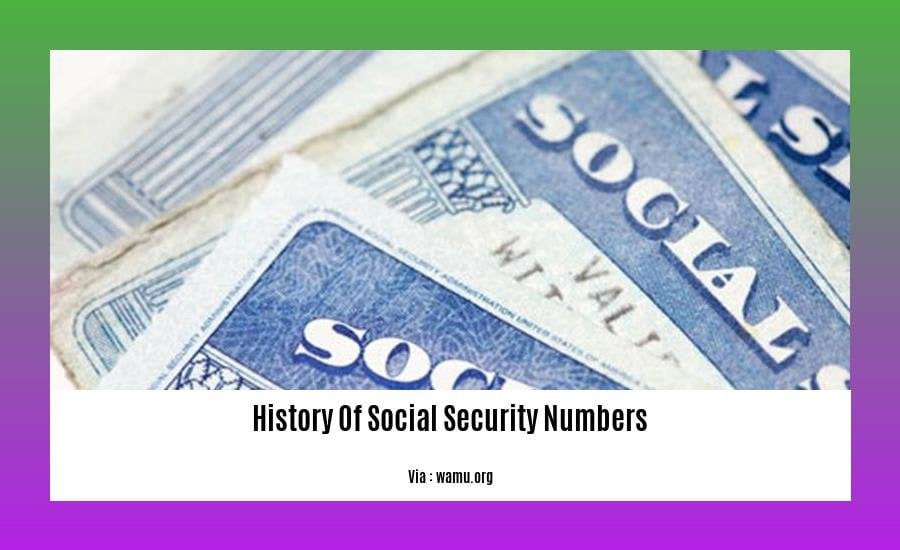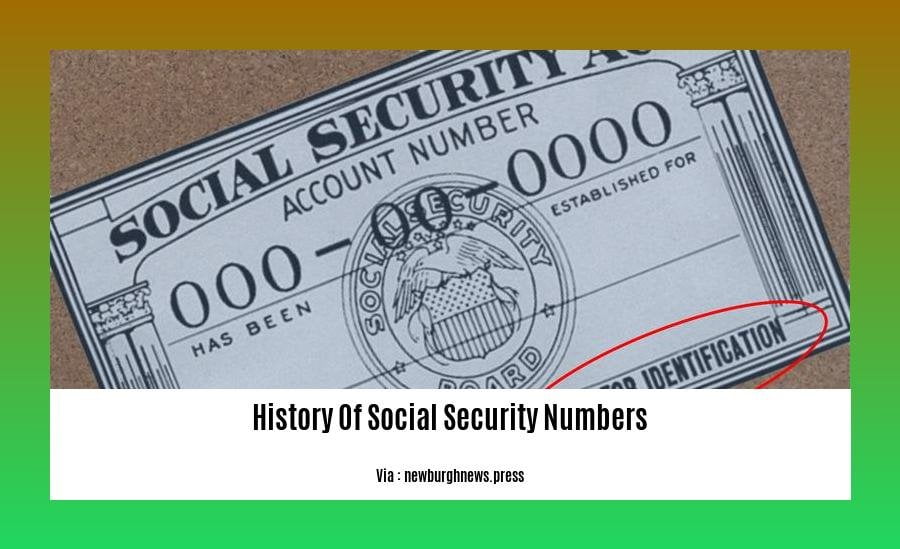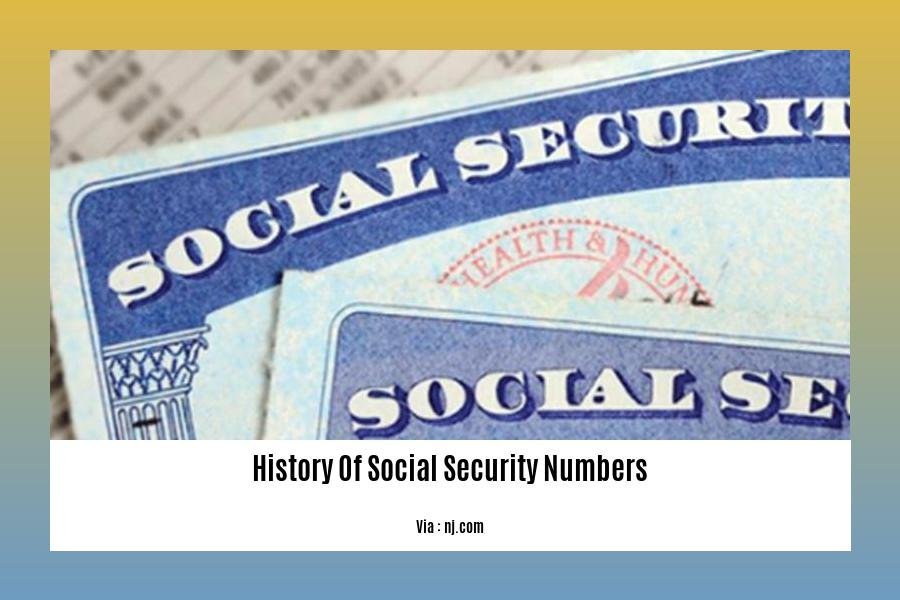Welcome to a journey through history as we unveil the captivating story of Social Security Numbers in our article titled [Unraveling the History of Social Security Numbers: From Inception to Impact]. Join us as we explore the origins, transformations, and profound impact of these unique identifiers on the lives of ordinary people. Delve into the evolution of societal systems through the lens of this essential piece of documentation, discovering its profound influence on our present-day world.
Key Takeaways:
In 1936, during The New Deal, the SSN was created to offer disability and retirement benefits.
Originally, the SSN’s function was to monitor income and distribute benefits.
Over time, the SSN’s applications grew to include tax identification and credit reporting.
Relevant links:
- What Is a SSN? Facts To Know About Social Security Numbers
- The Story of the Social Security Number – The United States Social Security Administration
History Of Social Security Numbers

Remember your first day at work when you nervously filled out those endless forms, including the mysterious Social Security Number (SSN) section? Have you ever wondered about the story behind this nine-digit code that seems to follow you everywhere?
The journey of the SSN begins in the midst of the Great Depression in 1935. As part of President Franklin D. Roosevelt’s New Deal, the Social Security Act was born, aiming to provide a safety net for Americans facing unemployment, old age, and disability. This colossal undertaking needed a way to track individuals and their contributions, thus, the SSN was conceived.
Initially, the SSN served as a mere tool for the Social Security Administration to keep tabs on earnings and dispense benefits. However, as time marched on, its significance burgeoned, metamorphosing into a linchpin of our financial and administrative systems. It became our gateway to taxes, credit checks, and even employment opportunities.
The SSN’s relentless expansion has been accompanied by a chorus of both praise and criticism. Proponents hail it as an indispensable tool that streamlines government services and facilitates secure transactions. Detractors, on the other hand, voice concerns over privacy and identity theft, arguing that the SSN has become an Achilles heel, easily exploited by fraudsters.
Understanding the History Of Social Security Numbers unveils a tale of evolution, adaptation, and controversy. From its humble origins as an accounting tool to its current status as a ubiquitous identifier, the SSN has left an indelible mark on American society. It’s a story that continues to unfold, with ongoing debates about its future role in our increasingly digital world.
The SSN: A Double-Edged Sword?
The SSN’s ubiquity has undoubtedly made our lives easier in many ways, but this convenience comes with a caveat. The SSN’s widespread use has made it a prime target for identity thieves, who can wreak havoc on our financial lives and credit scores.
Pros:
- Administrative Efficiency: The SSN has streamlined government services, enabling swift and accurate processing of benefits and tax returns.
- Financial Accessibility: It serves as a cornerstone for credit checks, allowing individuals to access loans, mortgages, and credit cards.
- Employment Opportunities: Many employers use the SSN as a means of verifying an applicant’s identity and work eligibility.
Cons:
- Privacy Concerns: The SSN’s prevalence has raised alarms about the potential for government surveillance and data breaches.
- Identity Theft: The SSN’s widespread use makes it a valuable commodity for criminals seeking to impersonate others and commit fraud.
- Discrimination: Cases have emerged where individuals have faced discrimination based on their SSN, particularly those with numbers indicating non-citizen status.
The SSN, with its dual nature, epitomizes the delicate balance between convenience and security. As we navigate the complexities of modern society, we must constantly seek ways to harness its benefits while mitigating its risks.
Discover the fascinating journey of Social Security, from its inception to its profound impact on American society. Delve into the history of social security and witness the evolution of a program that has shaped the lives of millions.
Controversies and Debates Surrounding Social Security Numbers

Picture this: a nine-digit number, assigned arbitrarily yet entwined with your financial identity, employment history, and even medical records. That’s the Social Security Number (SSN), a linchpin of American society, yet a source of ongoing controversies and debates.
Key Takeaways:
- The SSN’s inception in 1936 was shrouded in controversy, with concerns about government surveillance and privacy.
- Amidst its widespread use today, debates persist, balancing the convenience of administrative efficiency against privacy risks and the potential for identity theft.
- Critics decry the SSN’s role in perpetuating discrimination, particularly against non-citizens or individuals with certain numerical prefixes.
- Reform proposals aim to strike a delicate balance, preserving the SSN’s benefits while mitigating associated risks and safeguarding personal data.
Despite its ubiquity, the SSN’s history is checkered with debates and challenges. Initially conceived as a tool for tracking earnings and distributing Social Security benefits, its significance grew over time, becoming an essential identifier in various facets of life. Yet, this very ubiquity has fueled controversies and debates.
Privacy Concerns: A Double-Edged Sword
The SSN’s widespread use has raised serious privacy concerns. Critics argue that the government’s access to such a comprehensive database of personal information creates opportunities for surveillance and potential misuse. The specter of data breaches and identity theft further exacerbates these concerns, as the SSN serves as a key to unlock a wealth of personal data.
Discriminatory Practices and the Shadow of Bias
The SSN has also been implicated in perpetuating discriminatory practices. Cases have emerged where individuals with SSNs indicating non-citizen status have faced discrimination in employment, housing, and even healthcare. The numerical prefixes assigned to SSNs have, in some instances, been used as a proxy for determining eligibility for certain benefits or services, leading to accusations of bias.
Reform Imperatives: Striking a Delicate Balance
In light of these controversies and debates, calls for SSN reform have gained momentum. Proposed solutions range from eliminating the SSN altogether to implementing stricter data protection measures and enhancing cybersecurity. The goal is to preserve the SSN’s utility while minimizing the risks associated with its widespread use.
The SSN’s journey is far from over. As technology evolves and societal attitudes shift, the debates and controversies surrounding this ubiquitous identifier will undoubtedly continue to shape its role in our lives.
Sources:
[1] https://www.ssa.gov/policy/docs/ssb/v69n2/v69n2p55.html
[2]
Impact on Society and SSN System Today
In 1936, amidst the Great Depression, the Social Security Number (SSN) emerged as a linchpin of President Roosevelt’s New Deal, aiming to provide financial relief to Americans. Initially intended to track earnings for Social Security benefits, the SSN’s significance grew exponentially, becoming an integral part of our societal and administrative fabric.
Today, the SSN is deeply embedded in our lives, entwined with taxes, credit checks, employment, and myriad other transactions. It’s a double-edged sword, streamlining administrative processes while raising concerns about privacy and identity theft. Its widespread use has fueled debates about its role in our modern world, pitting convenience against security.
The SSN’s Societal Impact:
Financial Access: The SSN has become a gateway to financial opportunities. It enables individuals to build credit history, secure loans, and access mortgages, empowering them to engage in financial transactions seamlessly.
Employment Opportunities: Many employers rely on the SSN to verify applicants’ identities and work eligibility, ensuring a more secure and efficient hiring process.
Administrative Efficiency: The SSN has streamlined government services, facilitating faster processing of benefits and tax returns. It also simplifies record-keeping, making it easier for organizations to manage their data and provide efficient services.
Privacy Concerns: The SSN’s ubiquitous use has raised legitimate concerns about government surveillance and data breaches. There’s a delicate balance between the convenience it offers and the potential risks to our privacy.
Identity Theft: The SSN’s widespread adoption has unfortunately made it a prime target for identity theft. Criminals can use stolen SSNs to impersonate individuals, open fraudulent accounts, and commit various forms of financial fraud.
Key Takeaways:
The SSN has evolved from a tool for tracking Social Security benefits to a ubiquitous identifier in various aspects of our lives.
The SSN’s widespread use has undeniable benefits, including financial accessibility, employment opportunities, and administrative efficiency.
Privacy concerns and identity theft risks associated with the SSN’s prevalence have sparked ongoing debates about its role in society.
The SSN’s impact on society is a double-edged sword, necessitating continuous efforts to strike a balance between convenience and security.
Citations:
[^1^]: “Social Security Administration – History” https://www.ssa.gov/history/briefhistory3.html
[^2^]: “The History of the Social Security Number”
Identity Theft and SSN Protection: A Journey Through the History of Social Security Numbers
In the labyrinth of personal finance, there exists a number that holds a key to our financial identities—the Social Security number (SSN). Initially conceived as a tool for tracking earnings and benefits during the Great Depression, the SSN has evolved into a linchpin of our economic and social fabric. But with its growing significance comes a heightened risk of identity theft and fraud.
The Genesis of the SSN: A Safety Net in Times of Hardship
The SSN was born in 1936, amidst the Great Depression’s economic turmoil. It was a brainchild of the New Deal, President Franklin D. Roosevelt’s ambitious plan to provide Americans with a safety net during those challenging times. Its primary purpose was to track workers’ earnings and determine their eligibility for Social Security benefits.
The Rise of the SSN: A Universal Identifier
Over time, the SSN’s role expanded beyond Social Security. It became a universal identifier, used for taxation, employment verification, and accessing credit. Its convenience and efficiency made it an indispensable tool for both government and private entities.
The Double-Edged Sword: Benefits and Risks
The SSN’s widespread adoption brought undeniable benefits. It streamlined government services, facilitated financial transactions, and enabled employers to verify job applicants’ identities. However, this pervasive use also created a target for identity thieves and fraudsters.
Identity Theft and SSN Protection: A Constant Vigilance
The SSN’s centrality in our financial lives makes it a prime target for criminals seeking to steal personal information and commit fraud. They may use stolen SSNs to open fraudulent accounts, take out loans, or even file fraudulent tax returns.
Protecting Your SSN: A Shared Responsibility
Safeguarding your SSN is a shared responsibility. While government agencies and financial institutions have a role to play in protecting consumer data, individuals must also take proactive steps to protect their SSN.
Key Takeaways:
The SSN was introduced in 1936 as a tool for tracking earnings and benefits during the Great Depression.
Over time, the SSN’s role expanded, becoming a universal identifier used for taxation, employment verification, and accessing credit.
The SSN’s widespread use has brought both benefits and risks. While it has streamlined government services and facilitated financial transactions, it has also made individuals vulnerable to identity theft and fraud.
Identity theft is a growing crime in the United States, with the SSN being a prime target for criminals seeking to steal personal information and commit fraud.
Protecting your SSN is a shared responsibility, requiring both government agencies and individuals to take proactive steps to safeguard personal information.
Sources:
[1.] Social Security Administration: A Brief History
[2.] Forbes: Your Social Security Number: Everything You Need To Know
FAQ
Q1: When was the Social Security Number (SSN) established?
A1: The SSN was established in 1936 as part of The New Deal, to administer retirement and disability benefits.
Q2: What was the initial purpose of the SSN?
A2: Initially, the SSN’s purpose was to track earnings and determine benefit entitlement for Social Security.
Q3: How has the SSN’s usage evolved over time?
A3: The SSN’s usage has expanded beyond Social Security, now serving as an identification number for various purposes, including tax reporting, credit checks, and employment.
Q4: What controversies and concerns have surrounded the SSN?
A4: The SSN has faced criticism and controversies over the years, primarily due to concerns about government surveillance, data security, and the potential for identity theft and fraud.
Q5: How has the SSN impacted the lives of ordinary people?
A5: The SSN has significantly impacted individuals’ lives, serving as a unique identifier for accessing various essential services, tracking earnings and contributions, and facilitating financial transactions.
- China II Review: Delicious Food & Speedy Service - April 17, 2025
- Understand Virginia’s Flag: History & Debate - April 17, 2025
- Explore Long Island’s Map: Unique Regions & Insights - April 17, 2025
















